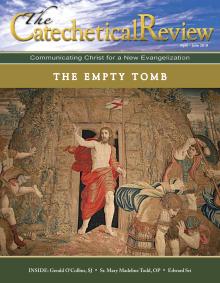“I know my kid has problems, but at least she’s not on drugs!” You’ll hear this uttered by moms appealing to their child’s teacher or by fathers trying to rationalize their son’s lackluster behavior. The intent of the phrase is to make one’s existing defects of character seem less significant when compared to someone who has “real” problems. In fact, I remember a mildly heated conversation during my own teen years, when my parents were beside themselves trying to get me to manage my personal life. My mom, sensing the tension and realizing that I really was a good kid, paused at one point and said, “Son, we really are pleased with you, at least you’re not on drugs.” Comforted by this low bar, I continued in my mediocrity.
While this statement is intended to give comfort, it offers a skewed perspective on our purpose for living. Our purpose is not to achieve an absence of vice but to pursue the presence of virtue (Gal 5:22-24; CCC 1784, 1803). If our life is simply measured by the lack of destructive behaviors, we will have set a low bar indeed.
Many parish RCIA processes operate on the “at least you’re not ___________” principle. They measure a candidate’s progress by the lack of obvious sin, more than the presence of virtue or adherence to the Gospel. Due to the challenges in the conversion process, a pastor or RCIA director can unwittingly believe that as long as one is willing to be baptized and there is no presence of serious sin, the RCIA has done its job. If you have found yourself in this place, allow me to inspire you to raise the level of expectation and transform your RCIA into what the Church intends, that is, to generate unbaptized evangelists.
Great Expectations
The expectation of the Church is that the RCIA is supposed to train catechumens (apprenticeship) in the entire Christian life.[i] By entire, the Church really means entire. By God’s grace, everything that should be part of the post-baptismal Christian life, with the exception of sacraments, should be present in some form before baptism: faith, hope, charity, repentance, prayer, moral life, good works, etc. (RCIA 75.1-3). There is one more aspect in which the Church expects catechumens to participate: the apostolic work of evangelism. The Church says, “catechumens should also learn how to work actively with others to spread the Gospel and build up the Church by the witness of their lives and by professing their faith (RCIA 75.1, AG 14).
So often those working in RCIA are just hoping catechumens will come to Mass every Sunday, and the thought of including catechumens in the apostolic work of the Church never crosses their minds. Most RCIA processes are structured for catechumens to only be receivers and not givers.
The rest of this online article is available for current Guild members.
This article is from The Catechetical Review (Online Edition ISSN 2379-6324) and may be copied for catechetical purposes only. It may not be reprinted in another published work without the permission of The Catechetical Review by contacting [email protected]

















